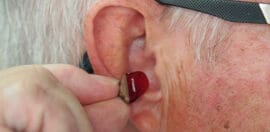Moving towards cultural safety for Aboriginal children with disability

27 March 2023 at 1:47 pm
The I Am, Movement puts Indigenous knowledge and experience at its centre.
There’s a movement afoot to provide more culturally safe resources to Aboriginal children with disability.
Called the I Am, Movement, it came from one mother’s quest to better support her son in his diagnosis and focuses on grassroots conversations and Indigenous experiences to create a more supportive and appropriate environment for these children.
Founder Tanika Davis tells Pro Bono News there was a lack of culturally appropriate information when her son Slade began his autism diagnosis journey.
“We had a lot of information about what autism was, but essentially not much [was] culturally safe or appropriate,” she explained.
When Slade was diagnosed, Davis said she was handed a calico bag stuffed with pamphlets of out of date information, some of which dated back to 2006.
“It’s embarrassing because everyone gets that when they’ve got their kids diagnosed and they’re getting this misinformation or they’re getting incorrect information. That’s not right,” she said.
But because of her background in Indigenous health promotion, she knew what she was looking for and what others would need.
“And one of the first things that we ever did as a family after his diagnosis was basically [say] how can we support our son better and maintain his culture throughout this journey?”
Davis knew there was a gap that needed to be filled, and in 2019 she started the I Am, Movement.
Unable to find culturally safe educational resources for their son, Davis commissioned an artist to create their own.
This project became the organisation’s first set of flashcards, which educate children through traditional cultural storytelling and colourful designs.
The flashcards helped Slade learn the alphabet, emotions and numbers, and Davis knew they were on to something special.
With her background in Indigenous health promotion, Davis knew how important it was for every resource the I Am, Movement produces to be done through that lens.
Indigenous health promotion is also at the forefront of her conversations with other families that make their way to the I Am, Movement for support.
And she makes sure it’s front of mind when she speaks with other services to spread awareness of cultural safety among them.
Those other organisations are getting in touch with the I Am, Movement more and more frequently for advice, Davis said, asking how they can do better.
“A couple of years ago it wasn’t even a conversation to be had and a lot of service providers or therapists were not doing things right,” she said.
She’s pleased that there has been a shift towards more culturally responsive practice in disability and children’s services.
What makes the resources culturally safe
The resources are designed by a First Nations elder and artist, based on how he learned, passing down the way that he was taught rather than “sticking to a white man’s way of learning in a classroom,” Davis explained.
The cards are all hand-painted and are designed to be used as cultural tools rather than educational aids.
Together, the flashcards tell a story about the local Country that I Am, Movement is based in. The colour blue is prominent, partly because it represents communication.
The work that has gone into designing and creating the cards therefore makes them culturally safe, Davis added.
Benefiting families
Davis said she has been contacted by multiple families who have discovered the I Am, Movement and have found its resources useful.
“That’s a win because we’ve shared our story to the point where other people are getting help, whether it’s accessing NDIS, whether it’s starting a conversation with their family members around what is autism, why does our child do things differently,” she said.
“That’s always been something that we’ve been really mindful about… we’ve done our job if the conversation around disability starts in our communities. One thing that we really pride ourselves on is telling our story… because you don’t know how many people you really will impact.
“It just reaffirms the power of storytelling [and how] it does impact our families.”
She hopes to be able to set up the I Am, Movement as a charity in future and be able to provide resources to families for free, to remove the uncertainty and financial burden they may otherwise face.
Davis said she continues to be fuelled by how she felt during her son’s diagnosis process.
“We wanted someone to be really open and upfront with us when we had our son diagnosed. That’s why we keep doing it, because we know there are families still every day having their children diagnosed and who don’t know where to go, especially in our community.”
She knows that these families may face stigma, confusion and hostility from others, and will embark on “a really long road to self-discovery” at the same time as their child receives a diagnosis.
She’s careful not to sugarcoat things and said being a parent of a child with disability can be hard — but it also brings rewards.
“We know that there’s such a need for having a voice in our communities and just being really honest. But when you work through those really hard times, it kind of puts everything into perspective around the good times that do come. And they come at moments where you don’t necessarily think that they’ll come either.”







